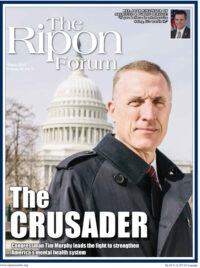 Congress is a reactionary body. In my time in the House of Representatives, I’ve experienced both the frustration of gridlock and the joy of substantial legislative progress. In most cases, regardless of the outcome, the challenges we’ve embraced as a lawmaking body have been largely driven by events.
Congress is a reactionary body. In my time in the House of Representatives, I’ve experienced both the frustration of gridlock and the joy of substantial legislative progress. In most cases, regardless of the outcome, the challenges we’ve embraced as a lawmaking body have been largely driven by events.
It is rare indeed that Congress addresses a problem before an event occurs. However, over the past year, the House Committee on Homeland Security has been doing just that. Together with Committee Chairman Michael McCaul, we have orchestrated over 300 meetings, events, and hearings with government, industry, and privacy stakeholders and experts to help form comprehensive, level-headed legislation that will help to mitigate, and more importantly, prevent, a cyber attack on our nation’s critical infrastructure.
I am pleased to say that in February, the Committee unanimously passed the National Cybersecurity and Critical Infrastructure Protection Act (NCCIP). This important bipartisan legislation will protect America from a cyber attack on our critical infrastructure, while prohibiting any new government regulations.
This is an issue that Congress must address before an attack happens. As we all know, this past holiday shopping season, sophisticated hackers gained access to the payment and order processing systems of retail giant Target. The personal information of as many as 110 million Americans may have been victims of the cyber attack.
A recent poll of national security experts by Defense News ranked cyberwarfare – not terrorism, a nuclear Iran or a rising China – as the greatest threat to the United States and its interests.
Virtually overnight, the personal financial data of nearly one out of every three Americans was compromised. Names, credit card numbers, addresses, phone numbers and e-mail addresses — all are at risk. The thieves who stole this information may not use it right away. In fact, the lasting effects of the data breaches will not be clear for months and even years. Families hoping to apply for a mortgage or buy a car will find their credit in tatters. Others will learn that credit cards and bank accounts had been opened in their names, or that criminals had used their identity as an alias after being arrested. Savings accounts and retirement funds could be drained long after the initial data was compromised.
As frightening as these consequences may be, the threat of cyber attack could lead to far greater disasters. State-sponsored hackers supported by countries like Iran and China could hobble our power grids, communications networks and financial systems. It’s no surprise then that a recent poll of national security experts by Defense News ranked cyberwarfare – not terrorism, a nuclear Iran or a rising China – as the greatest threat to the United States and its interests.
Federal policy should encourage collaboration between the private sector and law enforcement, and it should do it in a way that builds trust and fosters information sharing between government and industry. This is the strategy that the NCCIP Act seeks to employ – without compromising the privacy of American citizens, or imposing expensive and burdensome mandates on job creators.
Federal policy should encourage collaboration between the private sector and law enforcement, and it should do it in a way that builds trust and fosters information sharing between government and industry.
With NCCIP, Congress has a rare opportunity to show foresight, and act in a responsible manner to protect our nation. Furthermore, as a recent column in The Hill put it, “cybersecurity could be the next bipartisan breakthrough.” The NCCIP Act not only garnered support from every Republican and Democrat on the Homeland Security Committee, but enjoys another rarity – the support of both industry and privacy advocates. The ACLU called NCCIP “both pro-security and pro-privacy.”
As Chairman of the Cybersecurity Subcommittee, I am unwilling to stand speechless when asked “what did you do to prevent an attack?” Let us take this unique opportunity to be a proactive, productive, and protective Congress. Together, we can unite our nation against those who wish to do us harm. RF
Congressman Meehan is the Representative for Pennsylvania’s 7th Congressional District, which includes parts of Delaware, Chester, and Montgomery counties. He is currently in his second term. Meehan sits on the Homeland Security Committee and chairs the Subcommittee on Counterterrorism and Intelligence.




